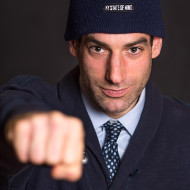One was a magazine editor and the other was a wealthy businessman. Their improbable partnership was forged by a shared passion to reform a bail system that has its roots in centuries-old English law. Later, their work took them to the nation’s capital, where they presented their findings before the U.S. Senate Judiciary Committee.
At the outset, however, the duo’s ambitions were modest. Herbert Sturz, the journalist, with the support of New York City’s mayor and the financial backing of his new wealthy friend, Louis Schweitzer, conducted an experiment from inside the city’s criminal court building. It became known as the “Manhattan Bail Project.”
Sturz and his staff interviewed defendants and measured their ability to return to court through a risk assessment based on work history, past criminal record and other criteria.
Concerned that too many people were sitting in jail solely because of their inability to afford a bail amount imposed by the court, Sturz and company—collectively known as the Vera Institute—began the experiment by dividing scores of people into two factions. The experimental group had their risk scores presented to a judge, while the remaining defendants were left primarily to the court’s desires.
As a result, 60 percent of those whom the project advocated for were released without bail, as opposed to only 14 percent of defendants who received no such endorsement.
The basic finding was that a risk assessment system, rather than arbitrary cash bail imposed at the whim of a judge, would not only keep people presumed innocent out of jail, but would increase their chances of winning in court. Due to the project’s efforts, more than 98 percent of the 3,000 people freed without bail over the course of three years returned promptly for scheduled court dates.
The Manhattan Bail Project’s findings are consistent with data emerging from community bail funds today, even with the jail and prison population at record levels. The nonprofit Bronx Freedom Fund, for example, reports that 96 percent of their clients return to court on time, and that 55 percent eventually have their charges dismissed.
The outcomes are dramatically different for those who languish in jail: 92 percent of “defendants who stay in jail until the end of their case because they can’t pay bail will plead guilty, forfeit their constitutional right to trial, and likely go home with a criminal record,” according to the Bronx Freedom Fund.
Bail is a staple of the American criminal justice system. When a defendant appears in court for an arraignment (the initial court appearance after an arrest), they’re typically assessed a bail amount. If they can afford it, they’re free to go. If not, they can toil in jail for weeks or months until their trial, or pay a bail bondsman a percentage of their bail—typically 10-percent—to get released. That amount is never refunded to them, even if they’re acquitted of all charges. For the most serious offenders, judges have the sole discretion to remand defendants to the court without imposing bail.
For those Americans who’ve grown up with bail bond reality TV, made famous by Dog the Bounty Hunter, the perception is that bail bondsman are necessary to ensure defendants don’t skip their court date. To the rest of the world, however, the idea of having a deputized private industry acting ostensibly as an arm of the judiciary is unheard of. The United States and the Philippines are the only two nations on the planet utilizing commercial bail bond industries. (Both countries, it turns out, are two of the most aggressive in the world in promoting the so-called “War on Drugs.”) Only four states in the country prohibit commercial bail: Illinois, Kentucky, Oregon and Wisconsin.
Still, the industry rakes in $2 billion a year, largely profiting off indigent suspects who can ill-afford to sacrifice rent payments or child-care costs to pay burdensome bail amounts.
A growing number of states have in recent years taken on bail reform, partly because the cost to jail innocent people has taken its toll on state finances. They include New York, New Jersey, Kentucky and California, along with individual municipal governments in such states as Alabama.
“In drafting the Eighth Amendment, which prohibits excessive bail, the founders sought to protect people from unchecked government power in the criminal justice system.”
—Sens. Kamala Harris and Rand Paul
Nearly two-thirds of the United States’ jail population consists of people who have not been found guilty of a crime. And the majority of defendants are detained inside county jails, which own 87 percent of jails nationwide, at a cost of $9 billion annually on pre-trial detention. California, a supposed liberal beacon, imposes the largest monetary load on its pretrial jail population, which accounts for 60 percent of jailed inmates in the state. With a median bail amount of $50,000, the Golden State has the unpleasant distinction of imposing an average bail amount that is five times the national average.
On average, 400,000 Americans each year choose to remain in jail until trial, simply because the cost of freedom is astronomically high. Meanwhile, a wealthy individual with a similar bail amount can pay the fee to the court and walk out until their trial date. Their riches affords them the opportunity to prepare a worthwhile defense, and as trivial as it may seem, appear to court well-kempt, bail reform advocates say.
Peter Goldberg, executive director of the nonprofit Brooklyn Community Bail Fund, said more than 10,000 people a year in five boroughs of New York charged with a misdemeanor with bail set at $2,000 or less won’t be able to afford it.
“Bail is sort of the grease in the wheels of this machine that just churns out misery and incarceration,” Goldberg told News Beat podcast from the bail fund’s Brooklyn offices. “Because in New York, we arrest close to a quarter of a million folks for misdemeanors every year, and there’s no way that those cases can be tried in any meaningful way.”
Two Systems of Justice
In 1964, then-Attorney General Robert F. Kennedy appeared before a U.S. Senate judiciary committee hearing on bail reform, and told the story of a New York man named Daniel Walker, who spent 55 days in jail on suspicion of robbery and couldn’t afford to post bail. It was debilitating. He lost his job and his credit was in tatters. His wife was forced to move back in with her parents. Walker, it turns out, was wrongly identified, and subsequently released. It took him four months to find another job.
As he advocated for federal bail reform, Kennedy testified:the “cruelty of the bail system is documented by case after case of persons so confined and then acquitted.”
“The problem, simply stated is: The rich man and the poor man do not receive equal justice in our courts. And in no area is this more evident than in the matter of bail,” he added.
When Lyndon B. Johnson signed the Bail Reform Act into law in 1966, which effectively did away with cash bail in the federal system, he said the country was making a commitment “that defendants are considered as individuals—and not as dollar signs.”
“Because of the bail system, the scales of justice have been weighted for almost two centuries not with fact, nor law, nor mercy,” he said. “They have been weighted with money.”
But for most of the country, the archaic bail system has stubbornly persisted.
Bryce Covert, an independent journalist, visited New Orleans recently for a story on cash bail in the city and described how orange jumpsuit-wearing and shackled defendants would speak to the one public defender in court through a “little plexiglass booth.”
The judge overseeing the proceedings, Harry Cantrell, has admitted that he refuses to set bail lower than $2,500, according to Covert. The facts, Cantrell acknowledged, have no bearing on his decision. Considering Cantrell’s position on bail, it’s not surprising then that 87 percent of defendants in his court were forced to post bail, with the overwhelming majority having to rely on a bail bondsman, Covert reported.
Covert also raised what appears to be a serious conflict of interest between the court system and bail bondsman in Louisiana.
“Louisiana law has this, I like to call it quirk…the law has been written such that a percentage of every bail bond written with a bail bondsman is then diverted back into the court system,” Covert told News Beat podcast. “So if you’re assessed with a $10,000 bond and then you go and you pay 10 percent of that to a bail bondsman to get out, a percentage of that money you gave the bail bondsman is then diverted back to fund the court system itself.”
“And that means it goes to the court,” she continued. “So Judge Cantrell gets a cut of it, and his budget gets a cut of it, it goes to the Sheriff’s Office, it goes to the District Attorney’s Office, whose prosecuting your case, and it even goes to the public defender’s office, which are the people charged with trying to get you out of jail without being assessed a bail bond. And that kick-back scheme brings in about a million dollars a year to the court system alone, just to Judge Cantrell’s court alone.”
The law suggests that the bail bond industry has amassed sizable political clout.
“I heard from people who said, in New Orleans in particular, ‘If you don’t have the bail bondsman on your side endorsing you, it can be hard winning elections,’” Covert said. “And so in Louisiana state government, they were able to help push for this law and help get it written into the state’s laws that, really, it doesn’t benefit them necessarily directly with money, but it does help keep them in business, because it gives everyone an incentive to keep assessing bail that’s high. To keep, sort of, pushing people towards bail bondsman and not to crack down on the bail bondsman because if those bonds go away, so does that pot of money.”
According to the Bureau of Justice Statistics, the more than 14,000 bail agents in the country are collectively responsible for securing bail for more than 2 million defendants annually.
For those defendants who can’t post bail on their own and are hesitant to pay a bail agent, another option is community bail funds.
“Bail is sort of the grease in the wheels of this machine that just churns out misery and incarceration.”
—Peter Goldberg, Brooklyn Community Bail Fund
One nonprofit in particular, the Brooklyn Community Bail Fund, is permitted under New York State law to post bail for clients charged with a misdemeanor, so long as the amount doesn’t exceed $2,000.
Goldberg, the fund’s executive director, said even at $1,000, however, 90 percent of defendants in New York City would not be able to post bail. Those who can’t are then sent to the notorious city jail on Rikers Island.
Since 2015, the bail fund has served upwards of 2,600 clients, more than 95 percent of whom make all their court dates.
“There are bail funds across the country that are operating that have seen similar results,” Goldberg told News Beat podcast. “The vast majority of folks just come back to make their court dates, often at great expense. They’re missing work, they’re needing to pay a ton of money for childcare.”
Terrence Bogans, the fund’s director of bail operations, said the toll on defendants sitting in jail unable to pay bail is considerable. And in order to cushion the blow to defendants’ finances or to avoid losing a precious job, many people agree to guilty pleas on charges that have yet to be litigated.
“People are two-to-three times more likely to have their case dismissed outright, or to have some non-criminal disposition with their case, simply from being out and having the opportunity to come back to court to fight their case,” Bogans said.
Bogans, who previously worked as a public defender in Brooklyn, maintains that the most important aspect of any criminal case is whether or not a person has bail set.
“There’s all of the media coverage about speedy trial, specifically in New York, for how long a case gets to trial,” Bogans explained. “For a misdemeanor where the maximum sentence would be one-year sentence where you would serve eight months, two-thirds of that time people often sit in jail past that period awaiting trial.
“So even if you want to fight your case, even if you have this overwhelming evidence that you’re not guilty of the crimes that you’re accused of, you don’t actually get to get to the point to prove that and make that argument on your own,” he continued. “And speaking about people who are having bail set, they are most often the most marginalized people. They are people who are already fighting to stay above water in their everyday lives.”
Bailed Out
Fifty years since Robert. F. Kennedy declared that bail “has become a vehicle for systematic injustice,” there appears to be a movement taking shape across the country to reform money bail and its disproportionate impact on the poor.
New Jersey, Arizona, New Mexico and Colorado are among the states reforming their bail system. In New York, Gov. Andrew Cuomo in January laid out a proposal to change how the state detains people before a trial:
“The blunt ugly reality is that too often, if you can make bail you are set free, and if you are too poor to make bail you are punished,” Cuomo said. “We must reform our bail system so a person is only held if a judge finds either a significant flight risk, or a real threat to public safety.”
While some states are addressing bail on their own, other municipalities have been sued on the basis of running an unconstitutional system.
“The problem, simply stated is: The rich man and the poor man do not receive equal justice in our courts. And in no area is this more evident than in the matter of bail.”
—Robert F. Kennedy, then-U.S. Attorney General
The nonprofit Equal Justice Under the Law has filed 12 lawsuits in nine states since 2015 challenging existing bail laws. Its efforts have so far have led to the end of money bail in seven municipalities in the South.
In Alabama, 78 cities have reformed their bail policies in response to challenges brought by the nonprofit Southern Poverty Law Center. The sweeping changes impact only defendants facing misdemeanors in city courts.
According to SPLC, the city of Mobile changed its bail policy on its own and has since seen a 45 percent drop in its jail population.
“Before Mobile changed its bail practices, many people were sitting in jail for up to 30 days because they could not afford to post bail, and many of those people would never even have received a jail sentence,” Nathan Emmorey, the chief municipal court administrator for Mobile, reportedly said. “Our bail practice reforms ensure that poor people or others will not sit behind bars unnecessarily.”
Samuel Brooke, deputy legal director for the Economic Justice Project at SPLC, said the reforms in Alabama represent 95-percent of the municipal courts in the state.
“What we have seen changed in Alabama is that municipal courts are moving toward a process where they will initially release everyone on what’s called a signature bond. And so the way this works is there is still a dollar amount tied to it, but the difference is you don’t have to pay it upfront,” Brooke told News Beat podcast. “Instead, you are released on a signature bond you sign, saying you will return to court on your court date, and if you don’t return, then there will be consequences. There might be a warrant issued against you, you will then owe the amount that is due, but the important thing is you’re not going to be detained pending that hearing just because of your poverty.”
To underscore what advocates see as a desperate need for change, Brooke said SPLC intervened when a member of the Alabama National Guard was charged with a felony for allegedly forging a $75 check. The woman, who was more than seven months pregnant, was held on $7,500 bail. Although the woman was medically diagnosed as having a high-risk pregnancy, she was sleeping on a mat on the floor inside an overcrowded jail.
“We’re more than happy to engage in litigation if that’s what’s necessary,” Brooke said. “But we would much rather help these institutions reform themselves without needing to resort to a federal court forcing them to. It’d be better for everyone, cheaper on all sides, not going to be legal fees, and frankly, it’s just more efficient and effective.”
Although criminal justice reform more broadly is seen as part and parcel of liberal policy agenda, the truth is, states that lean both Democrat and Republican have taken on bail reform.
This unlikely reality was on full display last July when Sens. Rand Paul, a Kentucky Republican, and Kamala Harris, a Democrat from California, proposed a bipartisan bill to encourage states to replace money bail with risk assessment systems.
Paul and Harris penned an Op-Ed in The New York Times introducing the bill—the Pretrial Integrity and Safety Act—that noted how Colorado and West Virginia have invested more in pretrial services and supervision in order to improve reappearance rates.
The bill proposes the federal government issue grants to individual states so they can formulate their policies.
“Enabling states to better institute such reforms also honors one of our nation’s core documents, the Bill of Rights,” the senators wrote in the Times. “In drafting the Eighth Amendment, which prohibits excessive bail, the founders sought to protect people from unchecked government power in the criminal justice system.”
“The bail reform movement does not seem to split, really, along red and blue lines in the way that you might think,” Covert, the journalist, said. “Kentucky is an example of a place that’s not some deep blue state that has enacted really meaningful bail reform, and there’s efforts underway currently. There’s a big push in California, maybe that doesn’t sound surprising, but there’s also pushes in Arizona and Texas and Nebraska. And I think you see people getting interested in this from the conservative side for a couple of reasons. One is people are worried about the cost of jailing so many innocent people, which is a legitimate concern. It costs a lot to keep people incarcerated. There’s a lot of questioning right now as to whether it’s worth the cost to keep these people behind bars.”
Covert, like many Americans, said she has only recently come to realize the scope of the pre-trial detention system in the country. That so many innocent people were being held in jail because of their economic situation ran “contrary to so many of the principles we uphold in this country.”
What we’re witnessing now, said Brooke of SPLC, is a “transformative movement” in the country.
“If a system is using money bail to detain people without doing any inquiry into their ability to pay, that is absolutely unconstitutional,” said Brooke.











